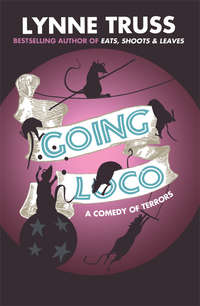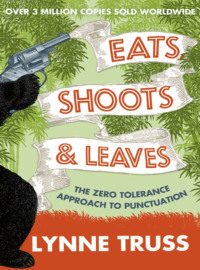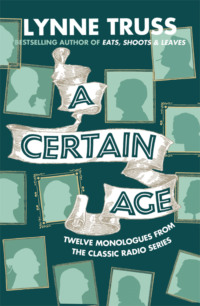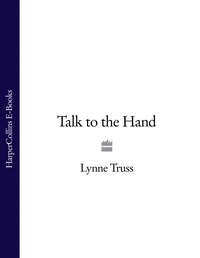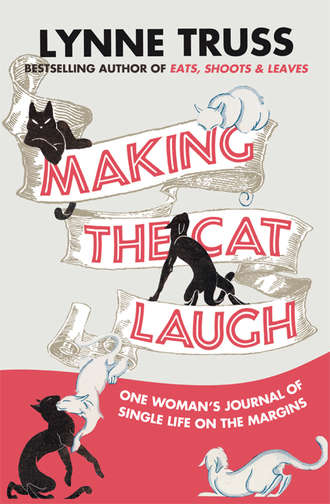
Полная версия
Making the Cat Laugh
If this sounds self-pitying and morbid, it is nevertheless something that single people very often joke about; the collective single mind contains a whole sub-section labelled: ‘What if I died?’ ‘Thanks for the present,’ they say, ‘but what if I died, and somebody found the room stacked to shoulder height with twenty-five years’ worth of Pet Fish Monthly?’ I remember a woman once proudly describing to me how she had rescued herself from acute self-consciousness by assembling a library of pop psychology books, with titles such as 101 Ways Not To Care What Other People Think. The effect of these books had been miraculous she said; she had been transformed into someone who did not give a damn. I was impressed, and asked her to check the publishing details. ‘Oh, but I threw them all out, in the end,’ she said in a lowered voice. ‘I mean, what if I died and people came in and found a load of books with titles like those?’

The day that I became single again – some time last August – I felt it was important to perform some symbolic acts. After all, I reasoned, you never know when a social anthropologist might be watching. I tried to picture what a newly single woman would be expected to do, to mark the reclaiming of the living environment after years of cohabitation. Washing the walls and beating the carpets sounded the right kind of thing – but on the other hand it also sounded a bit strenuous, and I didn’t want to alarm the cats.
So perhaps, instead, the newly single woman might do a little light tidying? Form the old newspapers into distinct new piles? Pick up the dusty used tissue that she always stared at, mindlessly, through hour-long telephone conversations? This all seemed manageable, given the emotional circumstances. Oh yes, and she might ceremoniously replace the lavatory seat to its ‘down’ position, with an exaggerated flourish and a round of applause. This was ample Coming of Age in Samoa stuff for a single afternoon.
But I remember that the first evening I was also moved to root through a heap of books until I found Anthony Storr’s Solitude. This was a book I had wanted to read for a very long time; and I felt I should seize the moment. I read it avidly until 9.30pm, after which I left it unopened on the coffee table for the next three months, hoping that some of its inspiring message would miraculously buoy my spirit. I don’t know why I stopped reading. People must have thought I was a real stoic, savouring a book called Solitude over such a long period. Either that, of course, or that I couldn’t read without moving my lips.
Storr thinks that solitude has much to recommend it. He says it promotes creativity – making people write novels, and so forth. Look at Anita Brookner, Edward Gibbon and, er, many, many others. Interestingly, a large proportion of our philosophers turn out to have been lonely miserable gits who walked about wearing buckets on their heads.
There was something wrong with the appeal of this argument, but I couldn’t put my finger on it. Months later, however, I do still hold out hope that the novel-writing and world-class philosophy stage will bounce along nicely when the time is right. I have bought a few note-pads, just in case. And a cardigan. The only trouble is that at the moment I can’t seem to pass a rather more mundane stage in the experience of solitude. I can’t seem to overcome my excitement at being able (at long last) to listen to The Archers without having to do it in the shed.
I never accepted the idea that ‘love means never having to say you’re sorry’. In my own case, love invariably means never being allowed to listen to The Archers – and in fact saying ‘Oops, sorry, I’ll turn it off then, shall I?’ when discovered in the guilty act. I kept faith with The Archers during three solid years of strict prohibition, just waiting for the day when I could again turn the theme tune up to maximum volume, as a statement: ‘Yes, I love The Archers, and I’m proud.’
My fanaticism may have been forced underground, but it remained resilient, like the French Resistance. I take this as living proof that inside every cohabiting person there is a single person humming ‘Dum de dum de dum de dum’ waiting to get out.
The more I think about it, the more I impress myself – the clever ways I found to mask my addiction. I remember those Sunday mornings when I would grab the car-keys at around 10.13am, saying, ‘Just popping down to Croydon for the Sunday papers, dear. I shouldn’t be more than, oooh, let’s say an hour.’ And I would dash off and sit in the car with dark glasses on, agog to the omnibus edition on the car radio. I don’t suppose the boyfriend ever suspected anything – although he did say: ‘Why are you taking a flask of cocoa?’ and ‘What’s wrong with buying them from the man on the corner?’
I expect the Archers euphoria stage was something Wittgenstein went through, too – and Edward Gibbon, I shouldn’t wonder. The other novelties certainly wore off, in time. The tidying of newspapers, for example, started to look like a mug’s game, so I ditched it. I expect I can call in a specialist with a fork-lift truck when I can’t kick a path to the window any more.
For a while, too, I made a point of playing records with significant words – ‘I’m Gonna Wash That Man Right Out of My Hair’; also ‘I’m Still Standing’ by Elton John – and lectured friends on the potency of cheap music.
But now the flat is sometimes eerily quiet, and I rattle around in it, like a lone Malteser in a shoebox. It is an odd thing, this single life. And Gloria Steinem’s famous feminist axiom – that a woman without a man is like a fish without a bicycle – has been of strangely little comfort. I agree with the sentiment, but I wish she had chosen a different image. Unfortunately I find it very easy to imagine a sardine on a mountain-bike joyfully bowling along country lanes; or a tuna in a yellow jersey winning the Tour de France on the happiest day of its life.

One of the consolations of getting older is that one day you look in your address book and find you have acquired a list of specialists (hairdresser, mechanic, hypnotherapist, carpet-layer) whom you can mention in conversation and pass on to your friends. ‘Try my Ear, Nose and Throat man,’ you say, offhandedly. Or, ‘My acupuncturist knows an aromatherapist who recommends a plumber who could really help you with that!’ Gosh, it makes you feel sophisticated. And at the same time, of course, it helps you fill the rather big address book (with pussy-cats on) that somebody gave you for Christmas.
I now have a builder, a carpenter, a gas man, and a painter and decorator. Most exciting of all, however, is the handsome ‘24-hour emergency gardener’, whose services I unfortunately rarely need. I sometimes think of him in the small hours, though, and picture him trouble-shooting in a dark garden somewhere, lashing daffs to splints in a high wind, looking Lawrentian. Should I call up with a bogus middle-of-the-night problem? ‘Thank God you’re there!’ I might say, feigning a verge-of-tears voice. ‘It’s – er, a 24-hour emergency! And here I am, clothed only in these – er, diaphanous jim-jams, unequal to the struggle with the elements!’
The only glaring hole in my list of blokes is under ‘window cleaner’, because the local chap simply refuses to clean my windows, on the grounds (I think) that I didn’t register with him in 1948. ‘Excuse me,’ I say periodically, pretending that the idea is quite a new one, and that we have never had the conversation before. ‘You wouldn’t do my windows, would you?’ He looks down at me from his position on the ladder, and just says ‘No’, but he packs the word with an impressive degree of hostility and affront. My question seems to offend him; I don’t know why. I mean, he is a window cleaner.
I mention all this because it is a great advantage of the single life to be able to say ‘There is something wrong with the heating; I think I’ll get a man in,’ without having to negotiate with the boyfriend first. Boyfriends, I find, tend to reply ‘No, let me take a look, I’m sure it’s straightforward,’ and end up emptying the S-bend on to their shoes at three in the morning. However competent the boyfriend, the sight of him with his head in the gas cupboard and the sound of bang!-clink!-Oops! is enough to make my blood run cold. ‘What do you mean, Oops?’ I say, dancing about in panic. ‘Nothing.’ ‘You said Oops!’ ‘No I didn’t.’ ‘You did.’
The trouble is that you start to identify with the boyfriend’s tussle with his ego, which is getting out of hand. And strangely, no amount of hand-wringing or helpful why-don’t-you-call-it-a-day noises make his tussle any easier. ‘It’s just this last hole,’ he says grimly, after a day of constant drilling, and you peek aghast into a room filled with brick dust and a wall that has been drilled so many times it resembles pegboard. The helpful suggestion, ‘Hey, let’s forget those silly old shelves, and give the books to the Russians!’ fails to lift the gloom.
Which is why I prefer the professional option. This is a simple business arrangement. If the bloke has problems with the job, his ego is his own affair. Recently, a rather lugubrious gas engineer came to remove the old pump from my central heating, and when he said ‘Oh dear, oh dear, it won’t budge an inch,’ and ‘Do you know, when you can get one side to come loose, the other side always sticks,’ I just said ‘Really?’ and carried on watching daytime TV. Afterwards, when he discovered his car had been towed away from outside my house, I did not identify with his wounded pride. I drove him to the car pound and told him the fine was usually about eighty quid.
Left to my own resources, I admit I do sometimes ‘get a man in’ when it is not strictly necessary. I once called a heating engineer when the only problem was that I had turned the thermostat the wrong way; similarly I recently called out a bemused Zanussi man merely to clean the filter on my washing machine. A live-in partner might have stopped me, perhaps; but on the other hand, I might equally have come home to find bits of washing machine all over the floor, and a scribbled note ‘Don’t use water. Have gone to Zanussi spare parts centre in Cornwall,’ while the culprit filter sat unnoticed, cocooned in soggy fluff.
On acquiring a boyfriend, then, it is important to know that a chap who says enthusiastically ‘Why don’t we knock the two rooms into one?’ is not necessarily an expert with a sledgehammer. He has just always fancied the idea of knocking down a wall. A friend of mine was married to a chap possessed of this spirit of enquiry, who carried a Swiss Army penknife at all times, and would offer to make new holes in watch-straps (sometimes when you didn’t want one). At dinner parties he was noted for telling stories of fast-thinking chaps with Swiss Army penknives who had saved lives by performing emergency tracheotomies. Understandably, everybody kept quite quiet after this, and chewed very carefully. The slightest choke, and you knew he was likely to leap from his seat and cut your throat. To him, it was the ultimate Do It Yourself.

You want to meet Vic,’ said Jonathan a few months ago, when I was having a therapeutic snivel one evening after a movie.
‘Why?’ I sobbed.
‘Because he’s a great bloke,’ he said, heartily. ‘Don’t be so suspicious all the time, Lynne. Loosen up. Vic is a real free spirit, with marvellous ideas, and funnily enough his last girlfriend just threw him out so he’s available. Some sort of bust-up over money, I think. Anyway, I’ll introduce you.’
‘What does he do?’ I sniffed.
‘He’s very young at heart. Ha ha good old Vic.’
‘What does he do, though?’
‘Well, he’s very artistic, and he’s promised himself that if he doesn’t get into something by the time he’s forty-eight, he’ll get a proper job.’
I thought about it. The distinct odour of rat whiffled past my nostrils, unignorably.
‘Does he like cats?’ I asked at last.
‘No, he’s allergic, I think.’
‘Thank goodness for that, then,’ I sighed with relief. ‘I had an awful feeling for a moment that he was exactly my type.’
I hate to be the bearer of bad news, but Vic is a phenomenon of our times. I used to think I was unlucky, but then I found out I was just single and averagely tolerant of failure, which made me a pushover for layabouts. It is possible that married readers are unfamiliar with the world of Vic, but each single woman discovers him for herself in a very short while. The telltale clue is when you find yourself paying for both dinners, but pretending not to notice. ‘Did I? Never mind, it’s only money. Tell me again about this project for knitting old cassette tape into lightweight blankets for the homeless, and charging them ten quid each. It sounds fascinating.’
Feminists, of course, are not supposed to admit that there is a man shortage. We have this horrible feeling that it will give ammunition to the backlash, who will jump up and down saying ‘Tee hee! Told you! Only yourselves to blame!’ But if there were a man shortage, hypothetically speaking, and it stretched out arid and flat to the far horizon, then you see that little shimmering dot in the distance? The one coming steadily towards you, like Omar Sharif in Lawrence of Arabia, getting slowly bigger and bigger and more sinister, as the only sign of available life? It’s Vic.
‘Tinker, tailor, soldier, sailor, Vic,’ goes the prune-counting of the wised-up single woman each morning. ‘Rich man, poor man, Vic, beggar man, thief, Vic.’ Vic ought to be more substantially represented in this litany, really; but you get the gist. The really interesting thing, however, is not that single women are eating too many prunes. It is that Vic, like the devil, is everywhere, yet always comes as a surprise. When he’s somebody else’s Vic, you can identify him at once. Whereas when he is your own, and he is blatantly using your mains electricity to recharge his car battery again, you can’t.
‘Ooh, so when will I get to meet him?’ you say to a friend who recently went out with Vic on a first date.
‘Soon, I expect. He’s moved in.’
There is a short pause, while you tell yourself it’s none of your business.
‘Really?’ you say, non-committally.
‘It’s working out quite well, actually. I mean, being home all day he can take in the milk.’
‘Great.’
‘And he cooks meals and things, and above all he trusts me with his problems.’
‘What does he do, then, exactly?’
‘He’s such a free spirit. Ha ha good old Vic.’
‘No, but what does he do?’
‘He used to be a disc jockey. And he’s got so many schemes he doesn’t know where to start. He reckons he needs a mobile phone and some headed notepaper before he can really get going. But unfortunately he hasn’t got either at the moment.’
‘He sounds – er, laid back.’
‘Yes! Sometimes we laugh about it. I say he’s so laid back he’ll fall off and hurt himself.’
‘Ho ho,’ you say, politely.
They are not all called Vic, incidentally. It would make things too easy if they were. But I do feel it is worthwhile to list a few of the obvious warning signs, so that more women can be spared the misery of asking Vic, on some fateful day, ‘Did you only love me for my free battery-charging facilities?’ and then waiting for five agonizing minutes while he seriously weighs up the pros and cons. The term ‘free spirit’ ought to set alarm bells clanging; also Vic’s habit of abruptly crossing the road to avoid walking past his bank. Watch out, too, for his suggestion (curious for a free spirit, after all) that you take out wills in one another’s favour after only a brief acquaintance.
The really clever thing about Vic is that he feels most comfortable with women who are independent, for reasons beyond the obvious. To an independent woman, you see, the notion of sponging is so unthinkable that she can’t bring herself to accuse anybody else of doing it. But the sad fact is, there are people in the world who consider themselves perfectly eligible for relationships yet whose personal motto is the same as New Hampshire’s: ‘Live Free or Die’. And unfortunately they don’t all wear it on a T-shirt.

They will sack me when they read this. But how can I keep pretending to be single when I have recently entered a rather serious relationship? Ho hum, another nice job down the drain. Of course, I didn’t mean to get into anything so heavy. In fact, I struggled quite hard against it.
‘Don’t you understand?’ I moaned, sinking dramatically to my knees, and hammering my fist on the Axminster. ‘I just can’t afford to get into this. I mean, literally. I can’t afford to get into this.’
It all started in June, when I took a few days’ holiday at a hotel on the north Norfolk coast, all by myself. I had envisioned a carefree time, joining boat-trip excursions to blustery sand-spit nesting grounds, pedalling my nice bike down poppy-lined B roads, and enjoying solitary meals in the hotel dining room with just a book for company. For of course (ha ha) I thought of it as ‘just a book’, then.
‘I’m taking Possession, by A.S. Byatt,’ I breezily informed the cats while I packed (hoping they would be impressed). ‘You know Possession, kitties: big one, really literary, Booker Prizewinner, everybody’s read it already, bit of a mouthful so they say.’ And I slung it in with the socks. None of us guessed what the future would hold – that after six warm days and nights of intimate contact with Possession, we would be locked in a tight stranglehold of book-and-woman relationship that would probably last for the rest of my literate life.
It is peculiar. I feel as though I have been married for forty years to the same book. Possession and I are not on the same wavelength, yet somehow I can’t break free, and there is no literary equivalent to Relate.
Last week, when somebody asked me to a dinner party, I said automatically: ‘Do you mind if I bring my book?’ And they said, er, no, of course not.
But they didn’t anticipate the change in me. We turned up at 7.30 (Possession and I) and sat quietly in a corner; and then we left together at about 10. ‘Are you sure everything is all right?’ whispered my host in the hall, as he showed us out. And I shrugged and raised my eyes to the ceiling, as if to say: ‘What I have to put up with.’
I got in the car and put Possession on the passenger seat, and thought back to our early days at the hotel, where my fellow diners often drew attention to my book at meal times.
I had thought it was funny, then, the way their friendly comments would have sounded frankly presumptuous had I been seated with a bloke instead. How would a chap react, I wondered, if strangers kept leaning over him to say to me, ‘Gosh, that’s a big one,’ and ‘But I can’t say I fancy it myself’?
Oh, what a Jezebel I used to be, when it came to books. ‘Use ’em up and cast ’em aside’ was my motto, as I notched up conquests on the bedpost, and blew smoke rings at the ceiling. I made bibliophile a dirty word. ‘Use it gently, won’t you?’ people said when they lent me books, and I laughed, callously, with a succession of’ Heh!’ noises. Living dangerously, I defied P.J. O’Rourke’s prudent advice that you should always read stuff that will make you look good if you die in the middle of it. Let death surprise me in flagrante with the Jeeves Omnibus, I cared not.
And now here I am, stuck in terminal monogamy with Possession, a book I shall certainly die in the middle of, because I shall never finish it.
I keep reading the same bits over and over again, you see, because the story glances off my imagination without sticking. ‘Try skim-reading,’ my friends advise me, but I am not that kind of girl. I weep, I rage, I do the kneeling and hammering thing on the carpet. But the book remains calm and implacable on the coffee table, its nice blue ribbon marking my place. I complain about Possession to my mum on the phone (‘We just don’t get on, mum’), and she says loyally: ‘Why don’t you bust up, like you did with old whatsisname, Henry James, that time?’
Sometimes, when you are unhappy in a relationship, it is good to talk about it. But it breaks your heart to think how casually it was undertaken in the first place. I mean, I only thought, ‘Better not take a funny book’ (since it sometimes disturbs people’s dinners when you suddenly bark explosively, sending bits of half-digested bread roll across the room); and ‘I won’t take any Anita Brookner, especially not the ones about lonely old maids reading in restaurants.’
Of such chance decisions are our manacles forged.
It is no good regretting it now. It is no good thinking of Dorothy Parker’s famous line, ‘This is not a novel to be tossed aside lightly, it should be thrown with great force.’ I sit glumly in my living room, humming the tune to ‘A Fine Romance’ in a minor key, and guiltily running my eyes over the books pages of newspapers while pretending not to.
Possession does not satisfy me: it is as simple as that. And all I can do is pace outside Waterstone’s on wet afternoons, feverishly wondering whether I dare run in, grab a copy of Madame Bovary and take it on an illicit ride in a cab.
News Stories That Captured My Imagination
I would like you to imagine the following narrative and see what is wrong with it. A woman, in Virginia, drives at top speed away from the house where she has just severed her husband’s penis. She is by nature a long-suffering person (as evidenced by her placid acceptance of her married name – Bobbitt – with all its connotations of finger puppets), but under the strain of the relationship she has finally snapped like a dry stick, and now she hares away from the grisly scene. She tosses the offending pizzle from the car window and drives on. All this may sound implausible, but in credibility terms it is easy meat compared with the next bit. For, shortly after, the police arrive, locate the member, pack it in ice and nee-naw it to a hospital (doubtless singing encouraging songs to it, to keep its peck – I mean, er, to boost its morale), where it is successfully reattached to a grateful Mr Bobbitt.
Now my point is this. If you leave a trowel in the long grass next to the shed, you can’t find it, can you? If you drop a clothes-peg on the kitchen floor and it bounces sideways, it can disappear for weeks. Yet for some reason Mr Bobbitt’s severed member was found easily by the side of a busy road. Is this not suspicious? If I were Mr Bobbitt, what would really worry me right now is not the imminent outcome of the court case against Mrs Bobbitt, nor even the off-colour willy-jokes at my expense (‘It will never stand up in court,’ and so on). No, I would be thinking: do I have the right willy? What if those well-meaning state troopers, scouring the dusty roadside (‘There it is! We got it!’), actually located somebody else’s?
You may not remember the old German film The Hands of Orlac, but it is relevant, I promise. The plot concerned a virtuoso pianist who by a crushing misfortune loses both his hands in a railway accident, but whose career is ostensibly saved when a scientist secretly sews on some donor hands belonging to a freshly hanged murderer, whose dexterous speciality happened to be strangling and knife-throwing. Doubtless you can see where this is leading. The post-operative pianist peers at his big mitts (‘They don’t look like mine,’ he comments, but tragically lets it pass), and then tries to practise some scales, only to find that – musically speaking – his new fingers have ‘Geest’ and ‘Fyffes’ written all over them. It is peculiar. Then one day his fiancée’s newspaper is snatched by a gust of wind, and he automatically picks up a Sabatier, yells ‘Leave this to me!’, and hurls the knife with such deadly accuracy that it nails the paper to the floor. Naturally, there is a significant pause while she looks at him, and he looks at the knife, and then they both look at his sewn-on hands, with glum expressions.


